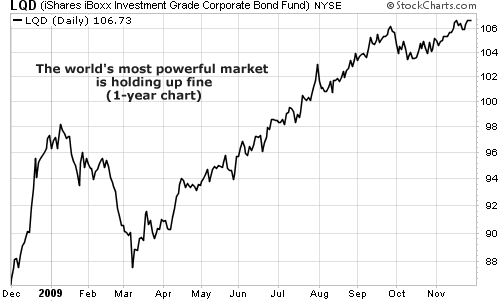| Home | About Us | Resources | Archive | Free Reports | Market Window |
You Can Earn 10% from the Safest Company in AmericaBy
Tuesday, December 1, 2009
I just listened to Bill Berkley's third-quarter conference call...
Bill Berkley started an insurance business while he was a student at Harvard in 1967 with $2,500 in capital. Today, Bill's company, W.R. Berkley, is the ninth-largest property and casualty insurer in America, with a market cap of $4 billion. "September was the first month in 34 months when our volume was up," Bill said. "The things we're seeing now are all the signs of a turn in the cycle." The insurance business moves in cycles. Supply and demand drive these cycles. When there are many companies offering insurance but only a few customers, there's too much competition. Prices fall and underwriting becomes unprofitable. They call this a soft market in the industry. When there are few suppliers of insurance and lots of buyers, there's a scarcity. Insurance prices soar, and it's easy for underwriters to make a profit. They call this a hard market. It's been a soft market for property and casualty insurance over the last four years. But according to Bill Berkley, low prices are generating losses at many insurance firms. These losses – combined with the collapse of AIG and the credit crunch – are sucking billions of dollars out of the industry and creating a scarcity of insurance. In other words, we're moving into a hard market. Bill predicts insurance prices will start rising in the first quarter of 2010. But it may be happening already Towers Perrin's Commercial Lines Insurance Pricing Survey (CLIPS) is the most accurate pricing survey in the insurance business. The most recent survey shows year-over-year prices in property and casualty insurance rose last quarter for the first time in four years. Insurance is a great business... especially when you're entering the sweet spot in the cycle. But there's another reason for investing in insurance companies right now... We're in a recession. I'm only interested in businesses that can thrive in a weak economy. Insurance fits the bill. People always need insurance... even in recessions. What most people don't realize is, insurance is also a money management business. Insurance companies have huge cash balances resulting from the premiums they collect. They can't spend this cash in case they have to make sudden payouts. But they can earn interest while they hold it. Insurance companies invest in stocks, bonds, hedge funds, and private equity. Some insurance companies even use their cash balances to make short-term loans like a bank. In recessions, insurance companies can make defensive investments in the stock market to hedge them against crisis. The most profitable company in Canada last year was an insurance company that had put on huge short positions in the stock market had bet on a collapse in subprime mortgages. Small and midsize insurance companies are the best way to profit from the new insurance cycle. We have three of them in the 12% Letter portfolio. But for the absolute safest bet among large insurance companies, Berkshire Hathaway is my favorite. Berkshire Hathaway is Warren Buffett's company. Buffett understands the insurance cycle as well as anyone. He'll have Berkshire's insurance operations perfectly positioned for the coming feast. With $24 billion on its balance sheet and one of the strongest investment portfolios on Wall Street, Berkshire Hathaway is arguably the safest company in the world for public investors. Buffett himself said you should expect Berkshire to produce 7% a year returns. But that was before the collapse of AIG. With the stronger insurance market coming and the new high-yield investments Buffett picked up during the financial crisis of 2008, I think you can expect average annual returns on your money around 10% from Berkshire's stock if you buy today. Good investing, Tom Dyson
Further Reading:
Why Buffett Does What He Does Market NotesTHE WORLD'S MOST POWERFUL MARKET Chalk up another positive mark for the global economy: The LQD just hit a new high. Longtime readers know we track the price of bonds for an instant read on the economy. While the stock market gets all the press, the bond market is a much larger and more powerful beast. This is where American businesses go to borrow money to pay for factory additions, new equipment, and new hires. If debts aren't being repaid, bond prices decline. If bond prices decline significantly, we have major problems. We track bonds with shares of the LQD fund. This is a broad basket of bonds issued by big companies like Dow Chemical, IBM, and Pfizer. As today's chart shows, bonds prices are climbing. The LQD is at its highest level of the year. Sure... the U.S. has all sorts of financial problems (the three biggest being debt, debt, and debt). But as long as real-world indicators like the LQD are soaring, we have to mind the market's message: "The government's giant funny-money program is staving off financial calamity, for now." 
|
In The Daily Crux
Recent Articles
|

